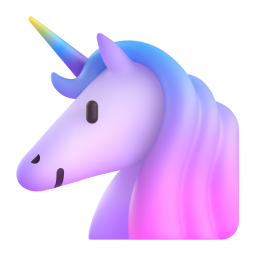🦄 Unicorn Face
The face of a unicorn, a mythical creature in the form of a white horse with a single, long horn on its forehead. Generally depicted as a white horse head facing left with a pink or purple mane and a yellow or rainbow-colored horn. In addition to the mythical unicorn, may be used to convey whimsy, fantasy, uniqueness, specialness, peace, and love. Often used for various content related to the LGBTQ community, thanks in part to its rainbow colors on many platforms. Also often used in association with “unicorn” startups. Sometimes used as a rainbow or holographic accent color. Vendors implement the emoji with the same or similar design as 🐴 Horse Face, but with colorful hair and a horn. Available as an Apple Animoji. WhatsApp’s unicorn is facing right. Google’s unicorn previously had a brown mane, Samsung’s a pink mane. Twitter’s unicorn was previously purple-colored with a blue mane.
🦄 Unicorn Face
Also known as: Unicorn
Image Variants

3D
Color
Flat
High Contrast
Version Information
Keywords
Shortcodes
| Platform | Shortcode | Action |
|---|---|---|
| Emojipedia | :unicorn: | |
| Slack | :unicorn_face: |
Additional Information
A mythical creature generally depicted as a white horse, with a long horn. Unicorn Face was approved as part of Unicode 8.0 in 2015 and adde http://emojipedia.org/unicorn-face/
- Relating to or characteristic of mysticism
- Of, or relating to mystics, mysticism or occult mysteries; mystical.
- Relating to mystics or mysticism.
- Of, or relating to mystics, mysticism or occult mysteries.
- Part of the body at the front of the head
- The face is a central organ of sense and is also very central in the expression of emotion among humans and among numerous other species.
- Faces are the central sense organ complexes, for those animals that have one, normally on the ventral surface of the head.
- The front of the human head from the forehead to the chin and ear to ear
- The front part of the head, featuring the eyes, nose, and mouth and the surrounding area.
- The phenomena of the physical world, and also to life in general
- Nature, in the broadest sense, is equivalent to the natural, physical, or material world or universe.
- Nature, derived from the Latin word natura, for "essential qualities, innate disposition", and in ancient times, this literally referred to "birth"; in a broader sense, it has been applied to the entire physical or material world, and in some mystical or metaphysical uses to realms of relationships beyond these.
- The set of all natural systems, including the air, land, water, and living things other than humans.
- The summary of everything that has to do with biological, chemical and physical states and events in the physical universe.
- Natural world or ecosystem.
- The natural physical world including plants and animals and landscapes etc.

